Urban Reform and Sexual Vice in Progressive-Era Philadelphia
The Faithful and the Fallen
Format:Hardback
Publisher:Bloomsbury Publishing PLC
Published:1st Jul '15
Currently unavailable, and unfortunately no date known when it will be back

This book examines the intersection and interplay between Progressive-Era rhetoric regarding commercialized vice and the realities of prostitution in early-twentieth-century Philadelphia. Arguing that any study of commercial sexual vice in a historical context is difficult given the paucity of evidence, this work instead focuses on reformers’ construction of a cultural view of prostitution, which Adams argues was based more upon their perceptions of the trade than on reality itself. Looking at the urban core of the city, Progressive reformers saw vice, immorality, and decay—but as they frequently had little face-to-face interaction with prostitutes plying their trade, they were forced to construct culturally fueled archetypes to explain what they believed they saw. Ultimately, reformers in Philadelphia were battling against a rhetorical creation of their own design, and any study of anti-vice reform in the early twentieth century tells us more about the relationship between activists and the government than it does about vice itself.
[S]pecialists will add this effort to their bookcases. * Journal of American History *
This richly detailed account enhances our understandings of early twentieth-century Americans' beliefs about prostitution and moral reform within the complicated geography of a transformed urban environment. -- David Ruth, Penn State–Abington
James H. Adams’s book casts a much-needed critical light on urban reformers in early twentieth-century Philadelphia. Adams astutely demonstrates that reformers actually did very little to reform one of the most recognizable figures of urban vice—the prostitute. Instead, they used sensational cultural discourses on prostitution to serve other political, social, and moral agendas. More often than not, such discourses on prostitution were used to draw clear boundaries between the urban and the rural, between racial others and whites, between promiscuous and virtuous women. -- Jill Suzanne Smith, Bowdoin College, author of Berlin Coquette: Prostitution and the New German Woman, 1890-1933
ISBN: 9781498508681
Dimensions: 237mm x 162mm x 20mm
Weight: 454g
212 pages